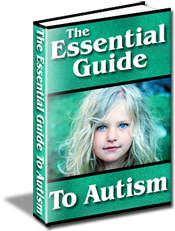Find Out The History, Symptoms and Treatment Of Autism
Click Here To Know The Simple Methods To Effectively Spot The 31 Signs of Autism
Autism is known by several different names. Some call it autism, others call it Autistic Spectrum Disorder, and others refer to it by what is typically known as a ?lighter? form of autism, Aspergers Syndrome or Aspergers Disorder. The disorder is usually identified by a marked delay in a child?s areas of communication and social interactions. While autism is not only found in children, it can typically be successfully identified during the first three years of a child?s life.
Autistic spectrum disorder is a difficult affliction to diagnose. There is not a physical ailment that can be readily seen, such as a broken arm or open wound, yet the affliction can be much worse than either of those if untreated or even worse, if it goes undiagnosed for a long period of time. Since it is difficult to diagnose, various tests are performed on the patient to determine if certain sets of criteria are met which would define autism. For this reason, the diagnosis of autism is a relatively subjective process that typically requires specialists in this area to accurately determine.
For several decades, autism has been known as one of the most severe neurological disorders pertaining to the normal development of a child?s communications skills, ability to focus and concentrate, and general social interaction skills. For a long time, it was thought to be relatively rare, but more recent studies estimate that approximately 1 in every 150 children are afflicted by it to some degree. Sometimes the ?degree? is almost undetectable and does not present a major challenge to that child as they develop and grow, but for others, it will clearly present them with challenges.
There is not a currently known cure for autism, but once it has been diagnosed and the severity of it determined, there are things that can be done to minimize the effects of it. Sometimes this may include prescription medications. Although the results are not yet definitive, some scattered reports of success have been noted with secretin treatments for both children and adults. Common treatments include special education with trained professionals who understand autistic spectrum disorder, which would also include behavioral interventions and dietary changes.
A prevailing thought, although not yet definitive, is that autism is a neurological or psychological disorder that is inherited. It has been concluded, however, that autism is not a reflection of parenting skills, where the lack of a nurturing mother would be a cause of autism. Some studies have indicated that a dietary change can have a notable positive effect on the autistic patient, like changing to a glutin-free diet. Other studies have shown that going through a process to remove mercury from the system had a very positive effect. But again, these studies are currently inconclusive.
Yet other studies have focused in other areas. For example, one thought is that the production of testosterone plays a role in autism, which would partially explain why such a dramatically greater percentage of males versus females are afflicted with ASD.
Since autism is difficult to accurately diagnose, sometimes the affliction which might be labeled as autism is actually Aspergers Syndrome, which simply put, is just a milder form of autistic spectrum disorder. For more information about Aspergers Disorder, you may wish to visit Aspergers Syndrome Explained to get more insights. Also similar would be many of the symptoms of yet another related disorder, Attention Deficit Disorder, and you can get more information about ADD at All About Attention Deficit Disorder.
Bottom line: watch your children and know the signs of autism, since early detection and accurate early diagnosis provides your best chances to minimize the detrimental effects.
Jon is a computer engineer who maintains web sites on a variety of topics based on his knowledge and experience. You can read more about Autism and Autistic Spectrium Disorder (ASD) at his web site at Autism Explained.
Labels: abilify_autism, acceptance_autism_book, activity_autism, adult_autism, america_autism_society

